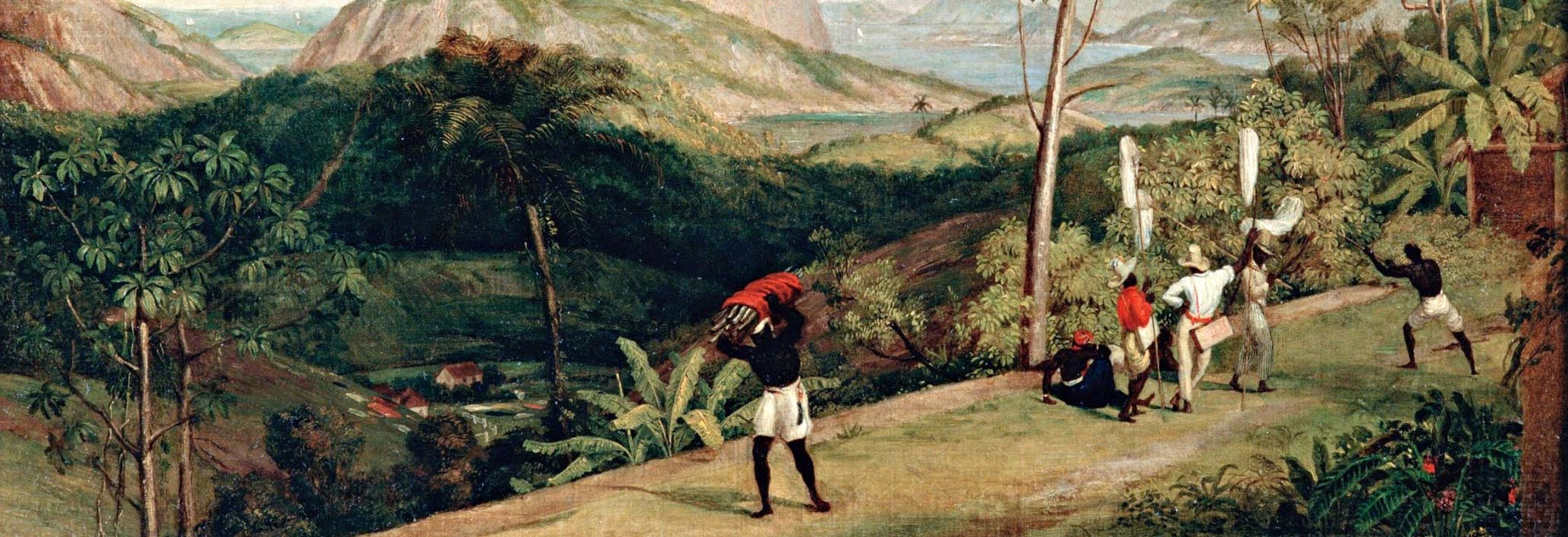Ana Joaquina dos Santos e Silva, merchant, entrepreneur, and slave trader was born in the early nineteenth century in present-day Angola most likely to a Portuguese man and a woman of mixed-race heritage. Very little is known of Santos e Silva’s early life, except that she married two Portuguese merchants and slave traders in quick succession. When each of the men died, Santos e Silva inherited their properties and became a wealthy entrepreneur in her own right.
At the time when Santos e Silva began to amass her fortune, the Portuguese slave trade was undergoing major changes. In 1836, Portugal passed laws to abolish the slave trade, but this law did not immediately go into effect in Angola. Traders resisted the law and widespread corruption in the colonial government slowed the implementation of this legislation. In 1850, Portugal abolished the slave trade in Brazil, eliminating the main market for Angolan slaves. Luckily, Ana Joaquina had diversified her business endeavors and continued to enjoy financial success in the wake of the massive shift in Portuguese slave trading.
Santos e Silva also owned large numbers of African slaves who worked on her agricultural properties as well as in her homes as domestics. When Santos e Silva traveled, she did so in a covered machillas (a covered litter) carried by slaves. Santos e Silva’s property included a sugar plantation at Icollo e Bengo in the Bengo River valley, a three-story mansion in the Bungo neighborhood of Luanda, a plantation in the interior district of Golungo Alto, and several farms at Mocamedes along the south coast of Angola. She owned a fleet of ships engaged in the slave trade between Angola and the Brazilian ports of Baia, Recife, Pemambuco, and Rio de Janeiro., and she conducted trade between Lisbon and Angola, as well as between Angola and Montevideo, Uruguay.
She also amassed considerable wealth as a lender. She lent money to other Angolan merchants and traders, but also to the Portuguese colonial government. Her investments expanded inland, investing in long-distance trade between the coast of Angola and states of the interior. She lent money to interior Portuguese traders (sertanejos) and African and mestizo traders (pombeiros). One of her most famous trade partners was Portuguese trader Joaquim Rodrigues Graca. Graca had been commissioned by Portugal in 1843 to establish trade links with the kingdom of Luanda (portions of present-day Angola and Democratic Republic of Congo). Although Portugal was unable to entice the Luandan king into a dependent political relationship, trade relationships between Luanda and Angola were formed. Due to her involvement in all of these businesses, Ana Joaquina dos Santos e Silva, popularly known as Dona Ana Mulata, died a wealthy woman in Lisbon, Portugal in 1859.
Read the full, original biography by Douglas Wheeler in The Dictionary of African Biography
Bibliography
Clarence-Smith, G. The Third Portuguese Empire, 1825–1975: A Study in Economic Imperialism. Manchester: Manchester University Press, 1985.
Wheeler, D. L. “Angolan Woman of Means: D. Ana Joaquina Sousa e Silva. Mid-Nineteenth Century Luso-African Merchant-Capitalist of Luanda.” Santa Barbara Portuguese Studies 3 (1996): 284–27.
Wheeler, Douglas L. "Santos e Silva, Ana Joaquina dos." Dictionary of African Biography, edited by Ed. Louis Gates Jr., edited by\ Emmanuel K. Akyeampong. Oxford African American Studies Center, http://www.oxfordaasc.com/article/opr/t338/e1809.
Author
Douglas Wheeler
Adapted by
Elizabeth Timbs and David Glovsky
Contributing Institutions
Hutchins Center for African & African American Research, Harvard University, Cambridge, MA.
Oxford University Press (USA) African American Studies Center.






